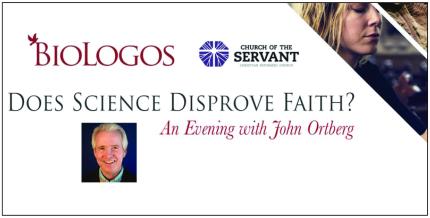Pastor and Scientist to Address Links between Faith and Science

On Sat. , May 19, at Church of the Servant CRC in Grand Rapids, Mich., two experts will address the question “Does Science Disprove Faith?”
One expert is best-selling author and Presbyterian pastor John Ortberg. The other is Sarah Bodbyl Roels, an evolutionary biologist who grew up in the Christian Reformed Church. Together, they will explore science, Christianity, and the harmony each of them have found in their lives and work between God's Word and God's works.
The event, hosted by Church of the Servant and BioLogos, which seeks in various ways to examine the connection between faith and science, is free and open to the public, but advance registration is required.
“John Ortberg’s church is in the midst of California’s Silicon Valley, and his sermons have reached thousands in this high-tech, data-driven area,” said David Butler, program manager for BioLogos.
Sarah Bodbyl Roels is an evolutionary biologist, expert in science communication, and a thoughtful Christian speaker, he added..
“While many people around us are convinced that modern science leaves no room for Christian belief, attendees will find themselves encouraged to engage with modern science, confident that there's truly a message of harmony between science and faith to be shared with those around us,” said Butler.
In an article titled “Questions Faith Asks Science,” published by the National Association of Evangelicals in 2015, Ortberg touched on the topic he will address this weekend.
In the article, he quotes Psalm 8:3-4, which reads: “When I consider your heavens, the work of your fingers, the moon and the stars, which you have set in place, what is mankind that you are mindful of them, human beings that you care for them?”
Refuting such writers as Carl Sagan, who claimed life on earth has no ultimate meaning, Ortberg commented: “The psalmist does not go on to say, ‘But people are huge. The earth is huge. The stars are tiny. We win!’ The psalmist agrees that the heavens make human life look puny.
“But it’s not! God has invested human beings with his own image and given us a capacity to learn, create, and care for the earth. Any worldview or system of thought that cannot account for the inescapable weight, dignity, and value of human existence must be found wanting,” wrote Ortberg.
Faith in God, Ortberg added, is not based on the gaps that science hasn’t yet filled in.
“The rise of science required a worldview that posited a world that is orderly and will reward rational investigation. That worldview arose from faith in an all-powerful rational God.”
In a talk she recently gave at River Terrace CRC in East Lansing, Mich., Roels spoke about her research in plant genetics, explaining that her research shows that certain flower species are able to reproduce on their own, even with the absence of pollinators such as bees.
“We see plant genomes change over a few generations,” she said. “We have to ask, ‘Why? What helps them do this?’”
More broadly, she said, science is exploring, expanding, and able to do more things “such as use implants to help rats, whose spinal cords have been injured, to walk again.”
Meanwhile, she added, “We are discovering all kinds of new galaxies, and the universe gets bigger all of the time. . . . There are many places to find wonder in the world.”
Behind and underneath it all is creation, an amazing mix of things to learn and discoveries to be made.
“All scientists, whether they are religious or not, have a fascination and wonder for the world, especially areas they work in. The more we find out, the more our wonder grows,” said Roels.
Christian denominations tend to be split between “progressive” churches that support the theory of evolution, which teaches that the world has evolved over billions of years, and “conservative” churches that give little validity to evolution and instead point to the account in Genesis as holding the truth about creation, she said.
But the CRC should be given credit for steering a middle-of-the-road position, allowing for the findings of science while at the same time holding fast to the teachings and truths of Scripture, said Roels, who teaches at Michigan State University.
“The CRC teaches that creation is a specific act of God,” she said. “God did it, but we don’t know how. The CRC realizes we are doing the best we can and we don’t have all of the answers,” said Roels.
“Taking this stance encourages fruitful scholarship. We live out our faith in community, and our community holds many, many different positions.”


